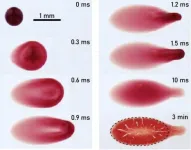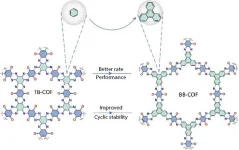(Press-News.org) Scientists have identified the genes in the probiotic Bifidobacteria longum responsible for improving gut motility. A research team reporting November 21st in the journal Cell Host & Microbe found that B. longum strains possessing the abfA cluster of genes can ameliorate constipation through enhanced utilization of an indigestible fiber called arabinan in the gut.
“We established the causal link between a genetic variant—the abfA cluster—to the key functional difference of probiotic B. longum in multiple model organisms, including mice and humans, and provided mechanistic and ecological insights into how a single gene cluster can affect the gut motility of hosts through arabinan metabolism,” says Qixiao Zhai of Jiangnan University, one of the paper’s co-senior authors.
Constipation is a globally prevalent bowel disorder with a worldwide prevalence of 10% to 15%. Impaired gastrointestinal motility has been implicated in gut microbial dysbiosis, which is characterized by a significant decrease in the abundance of beneficial microorganisms, some of which are conventionally known as probiotics. Orally administrated probiotics have therefore been widely used to alleviate symptoms.
Yet the therapeutic effect of probiotics for constipation often varies substantially across strains within the same species. Due to elusive mechanisms, the rational choice of probiotic remains challenging for medical care professionals and patients. In addition, most evidence on the beneficial effects of probiotics on gut motility mainly emerged from studies using a mouse model.
“Probiotic strains were often effective in animal models yet failed in human clinical trials or were poorly validated in humans,” says Jiachao Zhang of Hainan University, the study’s second co-senior author. “Proof-of-concept studies based on a human cohort in combination with evidence from animal studies are urgently needed for translational research.”
Zhai, Zhang, and Shi Huang of the University of Hong Kong, the paper’s third co-senior author, set out to identify and systematically validate the key genetic factors of exogenous probiotics or resident gut microbiota affecting gastrointestinal motility. They isolated 185 B. longum strains from 354 Chinese subjects who ranged in age from 0 to 108 years.
From a comprehensive library of wild B. longum strains, they discovered that the effective alleviation of constipation in mice is regulated by the abfA cluster. This key genetic factor preferentially enhances the utilization of arabinan—a common constituent of plant polysaccharides, an indigestible fiber for humans, and a poorly accessible source of nutrients for normal gut microbes.
The researchers further validated the abfA cluster’s functional roles using gene-knockout experiments. In mice with constipation, B. longum, but not an abfA mutant, improved gastrointestinal transit time—an effect that was dependent upon dietary arabinan.
To establish its functional roles for ameliorating constipation in humans, the researchers used a clinical trial and a human-to-mouse fecal microbiota transplantation experiment in combination with metagenomics and metabolomics. In the double-blind, randomized, placebo-controlled clinical trial, supplementation with abfA-cluster-carrying B. longum, but not an abfA-deficient strain, enriched arabinan-utilization residents, increased beneficial metabolites, and improved constipation symptoms.
Across human cohorts, abfA-cluster abundance in the fecal microbiomes predicted constipation, and transplantation of abfA cluster-enriched human microbiota to mice with constipation improved gut motility. Notably, other than B. longum, the abfA gene/cluster is prevalent in gut residents, regulating symptoms in both mice and humans.
The authors say that the abfA cluster is a gut-microbiome therapeutic target for constipation in humans. More broadly, the results suggest that genetic factors governing the unique metabolic capability of probiotics should be primarily considered for screening probiotics or inferring their treatment efficacy for gastrointestinal diseases.
“Collectively, this study identified and systematically characterized a key genetic factor responsible for arabinan utilization that addressed one critical challenge in the probiotic field, namely widespread yet unknown strain specificity in probiotic treatment efficacy,” Huang says. “Our proof-of-concept study also established generalizable principles for the rational development of colonizable, functional probiotics with persistent treatment efficacy in multiple model organisms. Moreover, the abfA cluster is so prevalent in the gut microbiota that it can be developed as a simple yet powerful biomarker for gastrointestinal diseases.”
###
This work was supported by the National Natural Science Foundation of China.
Cell Host & Microbe, Zhang et al.: “A key genetic factor governing arabinan utilization in the gut microbiome alleviates constipation” https://www.cell.com/cell-host-microbe/fulltext/S1931-3128(23)00415-8
Cell Host & Microbe (@cellhostmicrobe), published by Cell Press, is a monthly journal that publishes novel findings and translational studies related to microbes (which include bacteria, fungi, parasites, and viruses). The unifying theme is the integrated study of microbes in conjunction and communication with each other, their host, and the cellular environment they inhabit. Visit http://www.cell.com/cell-host-microbe. To receive Cell Press media alerts, contact press@cell.com.
END
WASHINGTON, Nov. 21, 2023 – Forensic science has captured the public imagination by storm, as the profusion of “true crime” media in the last decade or so suggests. By now, most of us know that evidence left at a crime scene, such as blood, can often reveal information that is key to investigating and understanding the circumstances around a crime — and that scientific methods can help interpret that information.
In Physics of Fluids, by AIP Publishing, a group of scientists from Boston University and the University of Utah demonstrated ...
About The Study: In this study of 25,000 veterans receiving dialysis, unstable housing experienced before starting dialysis was associated with increased risk of all-cause mortality, and risks increased with age. Further efforts are needed to understand the experiences of older adults with unstable housing and to estimate the scope of unstable housing among all individuals receiving dialysis.
Authors: Tessa K. Novick, M.D., M.S.W., M.H.S., of the University of Texas at Austin Dell Medical School in Austin, Texas is the corresponding author.
To access the embargoed study: Visit ...
About The Study: In this study of 7,000 older U.S. residents, food insecurity was associated with increased dementia risk, poorer memory function, and faster memory decline. Future studies are needed to examine whether addressing food insecurity may benefit brain health.
Authors: Aayush Khadka, Ph.D., of the University of California, San Francisco, is the corresponding author.
To access the embargoed study: Visit our For The Media website at this link https://media.jamanetwork.com/
(doi: 10.1001/jamanetworkopen.2023.44186)
Editor’s ...
Despite public perception, the Antarctic ozone hole has been remarkably massive and long-lived over the past four years, University of Otago researchers believe chlorofluorocarbons (CFCs) aren’t the only things to blame.
In a study, just published in Nature Communications, the group analysed the monthly and daily ozone changes, at different altitudes and latitudes within the Antarctic ozone hole, from 2004 to 2022.
Lead author Hannah Kessenich, PhD candidate in the Department of ...
Scientists have engineered a living material resembling human phlegm, which will help them to better understand how a certain kind of infection develops on the lungs of patients with cystic fibrosis.
The study, published in Matter, was led by Dr Yuanhao Wu and is a collaboration between Professor Alvaro Mata in the School of Pharmacy and Department of Chemical Engineering and Professor Miguel Cámara from the National Biofilms Innovation Centre in the School of Life Sciences at the University of Nottingham.
Biofilms are strong living 3D materials that play ...
EMBARGOED by JAMA Network Open until 11 am, ET, Nov. 21, 2023
Contact: Gina DiGravio, 617-358-7838, ginad@bu.edu
BU Study Finds Long-term Acute Care Hospital Closures Associated with Changes in Hospital Care Practices
(Boston)—Long-term acute care hospitals (LTCHs) are common sites of post-acute care for patients recovering from severe respiratory failure requiring long-term mechanical ventilation. Because of longer lengths of stay compared to regular, short-stay hospitals, the Centers for Medicare and Medicaid (CMS) reimburses LTCHs at higher rates. However, since 2005, ...
What is the mechanism that allows our brains to incorporate new information about the world, and form memories? New work by a team of neuroscientists led by Dr Tomás Ryan from Trinity College Dublin shows that learning occurs through the continuous formation of new connectivity patterns between specific engram cells in different regions of the brain.
Whether on purpose, incidentally, or simply by accident, we are constantly learning and so our brains are constantly changing. When we navigate the world, interact with each other, or consume media content, our brain is grasping ...
A drug that boosts bone growth in children with the most common form of dwarfism, may also reduce their chances of sudden infant death syndrome, sleep apnoea and needing surgery, according to a new study.
The international research trial, led by Murdoch Children’s Research Institute (MCRI) and published in The Lancet Child & Adolescent Health, has showed for the first time that vosoritide treatment increases height, facial volume and the size of the foramen magnum, the hole at the base of the skull that connects the brain with the spinal cord, in children under five with achondroplasia.
MCRI is the largest vosoritide ...
Zinc — cheap, abundant, environmentally friendly — may be the answer to better batteries, but there’s a major problem: Aqueous zinc ion batteries (AZIBs) cannot match lithium-ion batteries in terms of power output. To test what electrode material composition might be able to bring AZIBs up to par, a research team based in China developed two organic frameworks with the same constituents but arranged in different ways.
When put to the test, the framework with appropriate density of active sites — where the zinc ions gain electrons to recharge the ...
On October 13, 2023, in Addis Ababa, Armauer Hansen Research Institute (AHRI) and BGI Genomics signed a Memorandum of Understanding to enhance the Institute's genomics and precision medicine capabilities.
The Institute got its name from the Norwegian physician, Gerhard Henrik Armauer Hansen, who first described the leprosy bacillus (Mycobacterium leprae) and joined the Ethiopian Ministry of Health in 2004. Located in Addis Ababa, it serves as a biomedical hub for the region.
BGI Genomics provides ...



